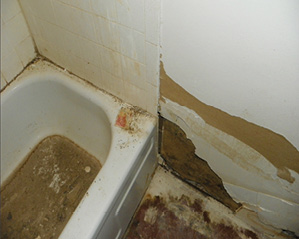
By LESLIE COLLINS
Northeast News
January 29, 2014
Deplorable. Unsanitary. Dilapidated. That’s how Bert Malone described the conditions of some of the motels and hotels allowed to operate in Kansas City.
Malone, deputy director of the Kansas City, Mo., Health Department, urged members of the Kansas City City Council to pass city ordinance 140032, which would give the city’s health department authority to enforce lodging license regulations and shut down hotel/motel operations when necessary.
Currently, the city’s health department is contracted by the Missouri Department of Health and Senior Services to conduct inspections of lodging establishments within Kansas City, Mo., to ensure those facilities meet safety and sanitation standards. If a lodging establishment is found to have violations and fails re-inspections, the city then turns the case over to the state health department.
Over the past three years, however, the Missouri Department of Health and Senior Services has faced severe budget cuts, and Missouri currently ranks second to last when it comes to state public health funding per capita, Malone said. As a result of budget cuts, less focus has been placed on enforcing penalties for lodging license violations, and within the last 10 years, the state has not suspended any lodging licenses, regardless of violations, he said. Sometimes the state will transfer a case to the city prosecutor’s office, but local prosecutors are strapped for time and tend to focus on higher priority criminal cases, Malone said. Unless a facility poses a “real and imminent health hazard” to current and prospective tenants, the city has no authority to enforce lodging license regulations.
“The state has an inability to do what needs to be done, which means it falls upon us to do it,” City Council member Scott Wagner said.
Of Kansas City’s 103 lodging establishments, 21 are operating without a state lodging license; three have operated more than a year without a license and one facility has been operating without a valid license since 2009.
“We certainly do need to give these (city Health Department) folks the tools they need to absolutely shut these things down,” said former City Council member and CEO of Northland Neighborhoods, Inc. Deb Herman, who said one of the motels in clear violation was located just blocks away from the Northland Neighborhoods office. That motel was shut down by the city, but is now operating again. “It’s a plague on our neighborhoods, and the people who live there are victimized. It just can’t go on.”
Violations in Kansas City motels and hotels have ranged from piles of dog feces on the floor to roach infestations and roach feces on the wall to sticky traps filled with decomposing mice and insects, all in occupied guest rooms. In other facilities, black mold climbed the walls and mattresses and pillows were sullied. Toilets and bathtubs were filled with debris and stained brown. Bed bugs are another issue, as well as hoarding.
One motel guest who was recently released from prison and now on parole told Malone, “I’d rather go back to prison than stay in this place where they put me. I am covered in bed bugs. There are cockroaches…”
Following the city Health Department’s photo presentation of safety and sanitation violations, City Council member Jim Glover said, “The need (for a new ordinance) is obvious and very graphic.”
Kansas City Police Department Sgt. Dan Graves said not only do these problem hotels and motels negatively impact tourism, they also attract crime, like mobile meth labs and other drug activity, prostitution, and weapons trafficking.
“I’m passionate about this,” Graves said. “There needs to be some accountability (for lodging establishment owners).”
During the Jan. 23 City Council meeting, council members unanimously passed city ordinance 140032. In addition to having a state license to operate, lodging establishments will also be required to obtain a city permit. If violations are found, the city will have the authority to cite the business for the violations and set a deadline for remedying the issues. If corrections are not made in a timely fashion and the violations are life-threatening or a potentially serious health hazard, the city will have the authority to immediately close the establishment or area in violation. If the permit holder is still in violation after three re-inspections, a city inspector can suspend or revoke the permit, and the lodging establishment owner will be given an opportunity for a hearing.
The newly approved ordinance also calls for a special election to be held Tuesday, April 8, which will ask voters to decide whether or not to approve establishing hotel/motel permit fees for regulating and inspecting those businesses.

















